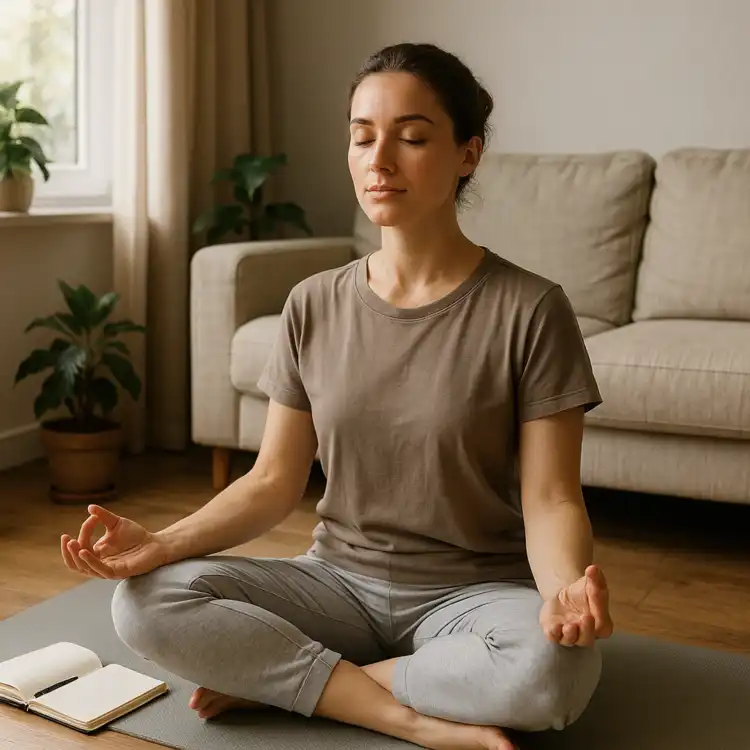Reduced Stress
Meditation lowers cortisol levels, the body's primary stress hormone.
2025-04-07
Did you know that just a few minutes of meditation daily can significantly reduce your stress levels? This practice not only calms the mind but also enhances your overall well-being. Let's explore the transformative power of meditation and how you can integrate it into your daily routine.
Understanding the key advantages and their impacts can motivate you to integrate meditation into your daily routine.
Meditation lowers cortisol levels, the body's primary stress hormone.
Regular meditation enhances attention span and concentration.
Meditation can reduce symptoms of anxiety and depression.
Encourages greater understanding of oneself and thought patterns.
Meditate whenever it fits into your schedule.
Your home environment can make it easier to relax.
Meditation is an incredible practice that offers numerous benefits for both mental and physical health. Imagine reducing your stress levels significantly just by taking a few moments each day to focus on your breath! By incorporating meditation into your routine, you might find yourself feeling more centered, calm, and in tune with your emotions. It can help improve mindfulness, which allows you to be more present and engaged in your daily life.
Some well-known benefits of meditation include:
By prioritizing meditation in your life, you'll not only benefit yourself but also those around you. When you're in a better mental space, you can respond to challenges more effectively and maintain healthier relationships. At Mind and Meridian, we believe that meditation is a powerful tool for personal growth and overall well-being!
One of the remarkable aspects of meditation is its versatility. You don’t need to leave your home to reap its rewards; a simple space can become your sanctuary. Whether you prefer guided sessions or silent reflection, there’s a technique out there that will resonate with you.
Starting a meditation practice at home can be a game-changer for your personal growth. Imagine having a dedicated time each day to connect with yourself and recharge your mind! Home practice allows for flexibility, enabling you to meditate at your own pace without the pressure of a structured class.
Here are a few reasons why establishing a home meditation practice is important:
At Mind and Meridian, we understand that beginning this journey can feel overwhelming, but remember, it’s about taking one small step at a time! Every moment spent meditating brings you closer to achieving the mental clarity and emotional balance you deserve.
Creating a meditation space at home is a delightful way to invite peace into your routine. Think of this space as a personal oasis designed just for you. The right environment can significantly enhance your meditation experience!
Let’s explore how to set up your ideal meditation area. First, consider location. A quiet corner of your home, away from distractions, can work wonders. You might even want to try different spots until you find the one that feels just right for you!
When selecting a location for your meditation space, keep these tips in mind:
Once you’ve identified the perfect spot, it's time to think about how to make it truly yours. Remember, your meditation space should reflect your personality and provide comfort!
Here's a brief recap of the key points discussed so far:
Creating a lasting meditation practice can feel daunting at first, but it’s entirely achievable! Building a sustainable routine is all about finding what works best for you. Let's explore some practical ways to develop a regular meditation schedule that fits seamlessly into your life.
The first step in establishing a meditation routine is to set a specific time each day. This could be in the morning, during your lunch break, or right before bed—whenever you feel most relaxed and focused. By committing to a consistent schedule, you'll create a gentle reminder for your mind and body that this time is reserved for self-care.
Here are a few tips to help you stick to your schedule:
One of the most rewarding aspects of meditation is its versatility. You can integrate mindfulness into your daily activities, such as walking, eating, or even washing the dishes! This approach not only enhances your meditation practice but also helps cultivate a state of mindfulness throughout your day.
Here are some ideas to weave meditation into your everyday life:
In today’s digital age, there are so many resources to support your meditation practice. Utilizing meditation apps and online courses can provide you with guided sessions, tools, and community support. It's like having a personal meditation coach in your pocket!
Before we continue, let's address some frequently asked questions about meditation:
Here are some popular apps and platforms to consider:
Connecting with others on the same journey can offer invaluable support. Whether it’s local meditation groups or online communities, sharing experiences and tips can motivate you to stay consistent. Plus, it’s a great way to learn from others who may have faced similar challenges!
Consider joining:
Music can create a soothing backdrop for your meditation sessions. Experimenting with calming music or nature sounds can help you achieve a deeper state of relaxation. Here are some types of sounds you might enjoy:
Incorporating gratitude journaling and affirmations into your routine can complement your meditation practice wonderfully. Taking a few moments to write down what you’re grateful for can shift your mindset and enhance your overall well-being. Affirmations can also reinforce positive thinking!
Here’s how to get started:
Remember, developing a meditation practice takes patience and consistency. It’s perfectly okay to have off days! Each small step contributes to your journey toward mental clarity and personal growth. I encourage you to share your experiences and reflections on starting your own meditation journey; we can uplift each other as a community! Let’s embrace this beautiful journey together!
Here is a quick recap of the important points discussed in the article:
For those interested in exploring alternative wellness practices, consider exploring acupuncture clinic options to complement your meditation routine.
